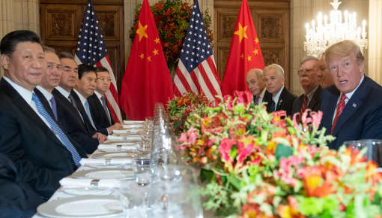- Ameya360 Component Supply Platform >
- Trade news >
- The US-Mexico trade deal may be bad news for China
The US-Mexico trade deal may be bad news for China
Now that U.S. President Donald Trump has bagged a political victory in the form of a trade deal with Mexico, the country's ongoing dispute with China looks set to drag on, experts said.
Mexico is "an important trading partner" of the U.S. and the deal offers Trump "some wins from a political perspective that the administration can point to ahead of the mid-terms", said John Woods, chief investment officer for Asia Pacific at Credit Suisse.
That's "not necessarily positive" for China, Woods told CNBC's "Squawk Box" on Tuesday.
He explained that based on the latest trade talks between the two largest economies in the world, the U.S. now wants China to commit to structural reforms rather than simply reducing the imbalances between the two countries. That makes any quick solution less likely, Woods said.
"I suspect that (Trump) will hold out on negotiating a settlement with China for the time being. I suspect it could even run through the mid-term elections in November," he said.
Woods' sentiment is shared by economists from Dutch bank ING, who wrote in a note on Tuesday that "as far as China and Asia are concerned, this new Mexico deal solves nothing."
However, the trade agreement "strengthens the US position to play hardball with China," they said.
"There is, right now, no visible interest from the US administration in pursuing talks with China over trade, and there will likely not be either unless China proposes some far-reaching changes to issues such as intellectual property protection and forced technology transfer," the economists wrote.
That means the additional $200 billion in U.S. tariffs on Chinese goods will likely come into effect in September, they all said. China will also likely retaliate to the extent that they can and worsen the dispute, they added.
But the deal with Mexico showed that the U.S. "is willing to concede" if the terms are right, which is a "good signal" to countries trying to negotiate with the Trump administration, said Juan Carlos Hartasanchez, senior director of Albright Stonebridge Group.
Those countries could also learn from Mexico how to move from "a very complicated negotiation where no progress was being attained" to what "seems to be a good resolution for both parties," he told CNBC's "Squawk Box" on Tuesday.
Online messageinquiry

China's Xi is about to deliver a speech that could have major consequences for the trade war

US will hold off on raising China tariffs to 25% as Trump and Xi agree to a 90-day trade truce

Expect a photo op and a 'mock deal' at the Trump-Xi meeting — not a long-term truce, says economist
- Week of hot material
- Material in short supply seckilling
| model | brand | Quote |
|---|---|---|
| MC33074DR2G | onsemi | |
| CDZVT2R20B | ROHM Semiconductor | |
| TL431ACLPR | Texas Instruments | |
| BD71847AMWV-E2 | ROHM Semiconductor | |
| RB751G-40T2R | ROHM Semiconductor |
| model | brand | To snap up |
|---|---|---|
| BP3621 | ROHM Semiconductor | |
| TPS63050YFFR | Texas Instruments | |
| ESR03EZPJ151 | ROHM Semiconductor | |
| IPZ40N04S5L4R8ATMA1 | Infineon Technologies | |
| STM32F429IGT6 | STMicroelectronics | |
| BU33JA2MNVX-CTL | ROHM Semiconductor |
- Week of ranking
- Month ranking
Qr code of ameya360 official account
Identify TWO-DIMENSIONAL code, you can pay attention to






















